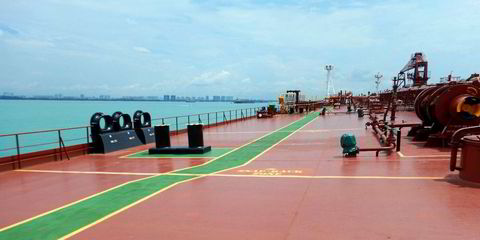Recently privatised Hamburg Commercial Bank (HCOB) is to target $1bn-worth of fresh shipping business this year, according to the newly appointed global head of shipping Jan-Philipp Rohr.
The move follows “a very successful year” for the bank in which HCOB — formerly known as HSH Nordbank — racked up fresh shipping business of almost $1bn.
Rohr says this is roughly the level HCOB needs to do again this year, if it is to maintain its shipping portfolio at current levels.
$1bn target
The $1bn target is small compared with the glory days of German ship finance, when the former state-owned bank had a $40bn shipping portfolio.
Rohr says the ship finance market has changed for banks, but adds that new business still accounts for about 20% of HCOB's existing €5.2bn ($5.82bn) shipping portfolio.
“We are one of the last German banks in the market that want to stay in shipping and want to do this sort of business,” he says.
He points to the emergence of Chinese leasing companies that are prepared to stump up the cost of financing large containerships up to 20,000 teu.
“No bank can compete with that. And this is not where we want to focus,” Rohr says.
HCOB did about 40 shipping deals last year, with the majority of transactions involving volumes of between $25m and $50m.
We have learned our lessons of the past. We will still lend to German clients, but we won’t look at the history and say: 'OK, he’s been a client for the last 20 years, and we have to do it
Jan-Philipp Rohr
The focus on smaller projects is deemed inevitable given the streamlining of the bank's shipping operations in recent years.
Streamlining operations
Some years ago, the former HSH Nordbank had offices in several countries including New York, Oslo and Copenhagen.
Today, the successor bank has just three shipping teams that are located in Hamburg, Athens and Singapore.
It is presently in the process of closing down its Hong Kong desk.
“The bank is getting smaller," says Rohr. "So, we have to streamline everything. We feel confident of being in the correct locations."
The cutbacks have hit top management at the bank, with the departure in March of Rohr's predecessor Christian Nieswandt.
Rohr's succession marks a rapid rise for a banker who joined HSH Nordbank in 2013, having previously spent most of his career with rival UniCredit.
On joining HSH Nordbank six years ago, Rohr initially worked as a relationship manager on domestic shipping projects.
Some of the deals he handled are said to have caught the eye of his new employers, helping to underpin his promotion this year to the top shipping job at the bank.
Today, nearly 40% of the bank's shipping business is still done in Germany, but an increasing amount is done overseas.
Some €2bn of loans are attributable to domestic shipping clients but the greater portion of €3.2bn goes to international business.

Rohr says that German clients are given no special privileges when it comes to risk.
“We have learned our lessons of the past,” he says. “We will still lend to German clients, but we won’t look at the history and say: 'OK, he’s been a client for the last 20 years, and we have to do it'.”
Some lending requirements will be more stringent. Bigger containerships, for example, will only be financed if they have long-term charters with one of the top-five names in the market. “Otherwise we will not touch it,” Rohr adds.
Everyone is focused on figures and targets for this year. That makes me confident we can achieve our targets
Jan-Philipp Rohr
Of HCOB's portfolio of nearly 600 ships, containerships make up 35.5%, bulkers account for 30% and tankers 16%.
Shipping hubs
These three core shipping areas will remain the focus of operations going forward, Rohr says.
Now that the shipping headcount has been trimmed from 20 to 18, there will be no further cuts to its shipping desk, Rohr says.
He adds that the new team will focus on bilateral transactions and fewer syndicated loan deals.
“For us, it’s not a moment when we want to do bigger syndications,” he says.
Rohr believes that in starting from scratch, the privatised bank finds itself in a more competitive position.
With its bad loans hived off to a state-backed warehousing scheme, HCOB operates with a clean balance sheet. It is able to pick and choose clients according to its own criteria, Rohr explains.
He adds that solid financial figures and new shareholders — a consortium led by Cerberus Capital Management and JC Flowers — mean its funding costs fall, which has made the bank competitive in markets such as Scandinavia.
Portfolio plans
Rohr says the bank is working on a new midterm plan for the next three years.
If it is to maintain its shipping portfolio at current levels, he says it needs new shipping business of between $750m and $1bn per year.
Achieving that depends on the future direction of the shipping market. Any worrying market developments will lead the bank to reduce the business, he says.
But the successful privatisation of the bank has given the shipping desk a new sense of optimism.
"Everyone is focused on figures and targets for this year," Rohr adds. "That makes me confident we can achieve our targets.”








